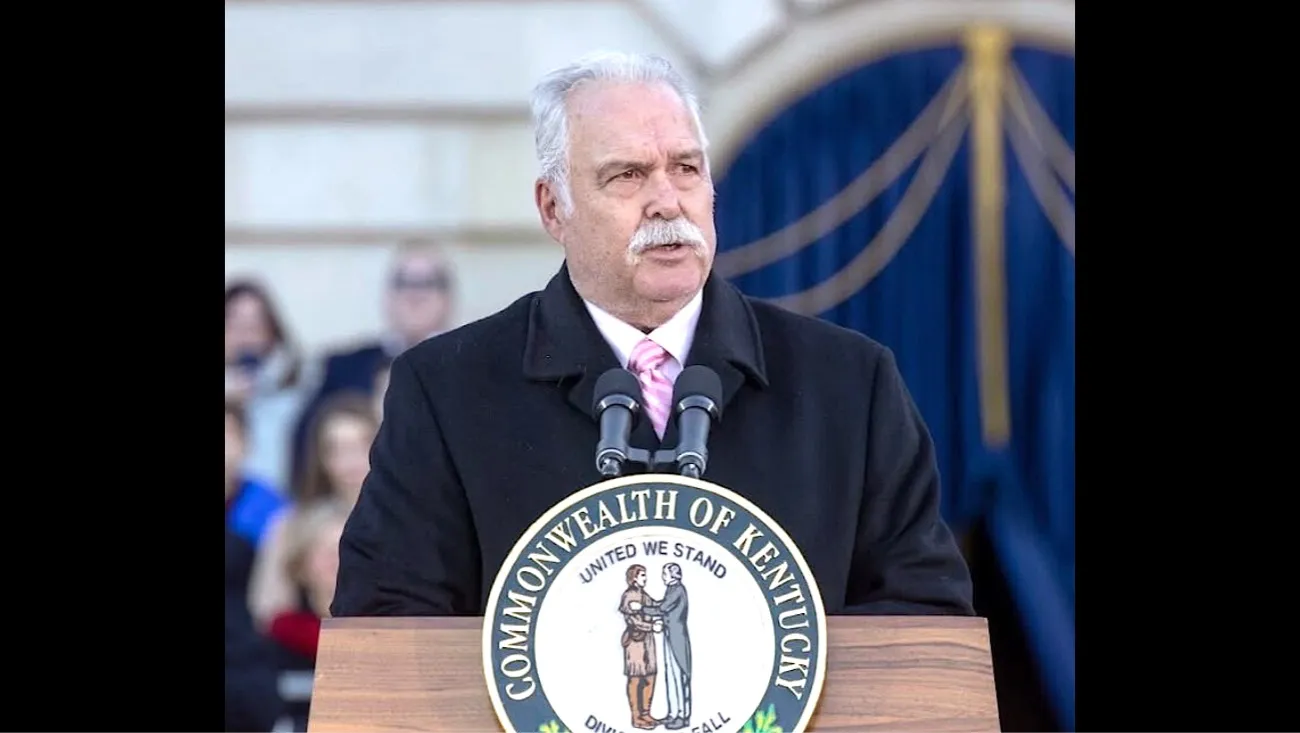In a year when the American Cancer Society asked the Kentucky legislature to increase spending on tobacco prevention, lawmakers cut it and passed an anti-vaping bill that some say could increase cigarette use in the state.
The two-year state budget’s allocation for tobacco prevention — about $8 million shy of advocates’ ask — “certainly is not” enough to combat use in the state, said Doug Hogan, the government relations director in Kentucky for the American Cancer Society and its Cancer Action Network.
The cancer society and others — including the Kentucky Hospital Association, Foundation for a Healthy Kentucky and the Kentucky Chamber of Commerce — signed onto a letter in January asking for a $10 million investment in the state’s Tobacco Prevention and Cessation Program.
Also writing in support of the $10 million for prevention and cessation were Dr. B. Mark Evers, director of the Markey Caner Center at the University of Kentucky, and Jason Chesney, director of the Brown Cancer Center at the University of Louisville.
“A well-funded fact-based tobacco control program is needed to counteract the $251 million per year that tobacco companies are spending to market their deadly and addictive products in Kentucky,” that letter stated. “As Big Tobacco has been working hard to addict future generations with e-cigarettes and other tobacco products, the need for more funding for tobacco prevention programs has never been greater.”
According to that letter, Kentucky sees $55 savings for every $1 it spends on tobacco control programs.
This session, lawmakers passed a bill touted as a way to curb underage vaping. The bill limits vaping products that can be sold in Kentucky to those that have approval from the U.S. Food and Drug Administration, have applied for FDA approval, or are challenging denial of FDA approval.
Advocates said that by limiting available vaping products, the bill could result in more Kentuckians turning to cigarettes. Tobacco cigarettes are worse for bodily health.
Vaping has eclipsed traditional smoking among Kentucky youth, advocates say, though Kentucky’s rates for both are higher than the national average.
“The only effective strategy is to adequately fund evidence-based programs,” the Cancer Society’s Hogan said, “that have a meaningful, measurable track record of success.”
Alicia Whatley, policy and advocacy director for Kentucky Youth Advocates, said the state needs a “comprehensive” battle against nicotine use in general. The roughly $2 million going toward cessation is “not nearly enough” to accomplish that goal.
“We don’t just want a database of who’s selling vape products,” she said. “We want something comprehensive that tells us who’s selling any of those products” — traditional cigarettes, chew tobacco, nicotine patches, vapes,” she said.
Under a new law, the Kentucky secretary of state is required to keep a list of retailers that sell vaping products. That law, HB 11, is meant to curb underage vaping by limiting sales to “authorized products” or those that have “a safe harbor certification” based on their FDA status.
In the final days of the session, this bill absorbed Senate Bill 344, which created an e-cigarette registry. The combined bill was signed into law by Gov. Andy Beshear on April 5. It goes into effect Jan. 1.
“It really should be more comprehensive, but I did not see that that was the case this year,” Whatley said. “I saw a lot of people just talking about vaping.”
Another new law, HB 142, directs boards of education to distribute tobacco prevention and cessation materials to students every year. It also requires schools to confiscate tobacco and vaping products and allows them to suspend students for subsequent violations of the ban on smoking and vaping on school property. It was delivered to Beshear in late March and he signed it on April 9.
What’s in the state budget for tobacco prevention?
The legislature’s two-year budget slightly cut funding for tobacco control in 2025, according to Cara Stewart, the director of policy advocacy at Kentucky Voices for Health. The funding then flattens out in 2026.
Right now, there’s about $2 million per year set for tobacco prevention efforts, said Hogan. That number drops by about $130,000 for the first year of the new budget. Then, for 2025-2026, it is restored to $2 million.
“Quite frankly, it’s outrageous that lawmakers ignored the urgent need for a significant investment in tobacco prevention and cessation,” Hogan told the Lantern in early April. “Lives are at stake. The health of our next generation is at stake with e-cigarettes and other products.”
Citing Centers for Disease Control and Prevention data, Stewart said Kentucky should be putting closer to $56.4 million every year into tobacco control, considering the state’s population and smoking rate.
Two bills that did not advance this session — HB 813 and SB 335 — would have assisted that goal by moving Juul settlement dollars from the General Fund to the Department for Public Health to support the Smoking and Vaping Cessation Program. Both were dead on arrival.
Public health advocates think that money should indeed be spent on tobacco prevention.
“Tobacco use is our number one preventable cause of disability, disease and death,” said Stewart. “Every single county in the state has a smoking rate above the national average.”
‘All smokers want to quit’
The CDC reports that “most” vaping products have nicotine in them, an “addictive” chemical that is “toxic to developing fetuses.”
Vaping products can also harm lungs and brain development in youth, the CDC says. E-cigarettes are not safe, the CDC says, though they’re safer than smoking traditional cigarettes, which the CDC reports is a leading cause of preventable death in the country.
Some research suggests vaping can help people quit traditional smoking. That hope helped push Louisville businessman Troy LeBlanc into the vape business.
About 11 years ago, it worked in getting — and keeping — him off cigarettes.
“All smokers want to quit,” LeBlanc said. “I went through Chantix. I did the gum. I did the patches. I did cold turkey. I did all these different things that never worked. Well, you know what did work? Vaping.”
“The whole point of electronic cigarettes” is to get people weaned off, he said, by tapering down their intake over time, eventually stopping.
“I cannot say that every person that walks into my store is doing it with this specific plan to quit vaping,” he said. But he has seen “multiple people quit vaping completely.”
LeBlanc told a legislative committee that the new law’s limits on vaping products “is essentially creating a monopoly for Juul,” an e-cigarette company.
Will anti-vape bills help public health?
It remains to be seen what effect anti-vaping legislation like HB 11, which takes effect Jan. 1, will have on public health.
Some in the vaping industry say it will drive consumers back to traditional tobacco products — an assertion buttressed by reports from Altria, the parent company of tobacco giant Phillip Morris USA, the leading manufacturer of cigarettes in the United States.
Altria is lobbying legislatures around the country to enact laws like the one Kentucky just passed. Altria also has moved aggressively into marketing its FDA-approved e-cigarette products.
In a February earnings call. Altria CEO Billy Gifford said that “illicit e-vapor” sales last year reduced Phillip Morris cigarette sales by 1.5% to 2%.
The February earnings report said a successful clampdown on disposable e-cig growth could increase Altria’s earnings per share between 5 cents and 15 cents, according to an analyst for Barclays, “if cigarette volumes improve and e-cigs decline or remain steady.”
Since January 2022, Altria has spent more than $500,000 lobbying the Kentucky legislature, according to reports filed with the Legislative Ethics Commission.
“To the extent that this drives people back to smoking, how does this help public health?” said Greg Troutman, a lawyer for the Kentucky Smoke Free Association, which represents vape retailers.
Troutman said the new law will “blackmarket” vape products that have unknown ingredients.
People who smoke increase their risks of heart disease and strokes, according to the CDC. But it doesn’t hurt just them. Nonsmokers who breathe secondhand smoke are much more likely — 20% to 30% — to end up with heart disease or stroke, the CDC says. Kentucky already has dismal rates of heart disease mortality and stroke.
In 2021, a California-based study found that when flavored e-cigarettes were banned, minors turned to traditional cigarettes. At that time, researchers found that “reducing access to flavored electronic nicotine delivery systems may motivate youths who would otherwise vape to substitute smoking.”
At the time of publication, study author and assistant professor of health policy at Yale School of Public Health Abigail Friedman urged caution when passing legislation attacking vapes only.
“While neither smoking cigarettes or vaping nicotine are safe per se, the bulk of current evidence indicates substantially greater harms from smoking, which is responsible for nearly one in five adult deaths annually,” said Friedman. “Even if it is well-intentioned, a law that increases youth smoking could pose a threat to public health.”
--30--
Written by Al Cross. Cross-posted from KY Health News.







